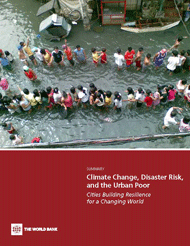
These risks are exacerbated by overcrowded living conditions, the lack of adequate infrastructure and service, unsafe housing, inadequate nutrition, and poor health.
A new World Bank report, Climate Change, Disaster Risk, and the Urban Poor: Cities Building Resilience for a Changing World, outlines a set of actions that can help build resilience for those at greatest risk in cities. Implementing these actions will involve a strong commitment by local governments working with communities, as well as national and international institutions.
The study, which was supported by Cities Alliance, was launched at the C40 summit of mayors in São Paulo, Brazil earlier this month.
It examines the linkages between climate change, disaster risk, and the urban poor, highlighting four key messages:
- The urban poor are on the front line. The poor are particularly vulnerable to climate change and natural hazards due to where they live within cities, and the lack of reliable basic services.
- City governments are the drivers for addressing risks through ensuring basic services. Local governments play a vital role in financing and managing basic infrastructure and service delivery for all urban residents. Basic services are the first line of defense against the impacts of climate change and natural hazards.
- City officials build resilience by mainstreaming risk reduction into urban management. Climate change adaptation and disaster risk reduction can be best addressed and sustained over time through integration with existing urban planning and management practices. Good practice examples exist and can be replicated in cities around the world.
- Significant financial support is needed. Local governments need to leverage existing and new resources to meet the shortfalls in service delivery and basic infrastructure adaptation.
Climate Change, Disaster Risk, and the Urban Poor is part of a broader effort under the Mayors’ Task Force on Climate Change, Disaster Risk and the Urban Poor that was launched at the Mayors’ Summit in Copenhagen in 2009.
More about Climate Change, Disaster Risk, and the Urban Poor




